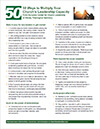This free 50 Ways resource provides strategies to identify and support new leaders and build and maintain effective ministry teams.
Make it easy for new leaders to get started
- Consider ways to divide responsibilities among two or more individuals. Job sharing makes it easier for people to say “yes” and gets more people involved.
- Ask existing leaders to invite someone new to partner with them as a way of easing someone new into a leadership role.
- Invite people to join a team or take on a responsibility on a trial basis. Trial periods let everyone get a feel for things and allow for a graceful exit if it’s not a good fit.
- Be honest about the time commitment required when someone steps into a new role. Vague expectations are off-putting and scary to potential leaders.
- Avoid open-ended terms of service. No one wants to risk being saddled with a job forever. And term limits incentivize the search for the next leader.
- Communicate a clear pathway for people to get involved in ministries and progress into leadership.
- Maintain clear and up-to-date job descriptions. Ask leaders to keep good records that will allow the next person to hit the ground running.
- Don’t assume simple tasks are always the best starting place. High-capacity people will only give their time to meaningful, challenging responsibilities.
- Initiate new groups and programs regularly because they are more attractive and welcoming to new people than long-standing structures, which can be cliquish.
Build on the power of relationships
- Schedule one-on-one conversations with prospective leaders to strengthen your interpersonal bonds and get to know their interests, gifts, and passions.
- Make a special effort to get to know new people in your congregation or your neighborhood.
- Think of your small groups as leadership incubators and their leaders as scouts. It’s often within the relational bonds of a small group that individuals experience spiritual growth and discover their gifts and callings.
- Capitalize on the power of personal invitations. People are most motivated to do something when asked personally by someone they know.
- Exploit the power of networks. Think beyond the people you know personally to those people your friends and acquaintances know.
Think beyond the usual suspects
- Cast a wide net when looking for new leaders. Thumb through the whole church roster to think of people who might not otherwise come to mind.
- Don’t limit your search to church members or attendees. Inviting someone from outside your church into a meaningful leadership role can be a great way of introducing them to your church’s mission.
- Signal your openness to new people by displaying younger and more diverse leaders in visible roles, such as worship leadership or staff roles.
Invite people effectively
- Maintain a bold, confident manner when asking someone to do something. Being reticent, uncertain, or apologetic is counterproductive.
- Stay positive. Appeals to guilt or desperation motivate few, and communicate that your ministry is struggling or marginal. People want to be part of something vibrant and hopeful, not something that is spiraling downward.
- Don’t rely on a single approach to recruiting people. Different people respond to different kinds of appeals, so mix it up occasionally.
Help people discover their gifts
- Provide opportunities for people to explore their spiritual gifts through classes, gift inventories, and other structured means of gift discovery.
- Avoid pigeonholing people according to their professional skills. An accountant may have spiritual gifts for teaching and a teacher may be spiritually gifted for administration.
- Practice the “ICNU” approach. Train yourself and others to notice people’s gifts and then start a conversation with “Here is what I see in you….”
- Think beyond people’s current capabilities. Imagine what they might become and help them learn to see areas of giftedness they don’t yet recognize in themselves.
- Encourage every member of your church to listen for God’s call on their lives. Too often laypersons think that God’s call does not extend to them.
Delegate and empower
- Encourage long-standing leaders to make space for new people by stepping aside and relinquishing control, while still collaborating and providing support.
- Give new leaders the flexibility to innovate and implement goals creatively in service of the church’s overall mission and vision.
- Equip people with what they need to succeed in a new leadership role — resources, information, training, affirmation, etc.
- Support people in what they want to do rather than only trying to find new people to do what you need them to do.
Mentor new leaders
- Know that informal mentoring is often a more effective way of preparing new leaders than formal leadership training.
- Encourage existing leaders to invite someone new to “come alongside” and learn by observing, helping, and debriefing while on the job.
- Embrace a mutual mentoring approach in which seasoned leaders share their wisdom while also seeking input and fresh perspectives from newer, younger people.
Develop a culture of team leadership
- Rather than looking to an individual to manage a project, ask if it’s an opportunity to create a team.
- Structure teams so that each member has a distinct and vital role. Commitment and accountability are enhanced when each team member knows their contribution is essential to the team’s success.
- Multiply your teams and the number of team leaders by subdividing tasks and creating new teams when a job grows too large to be accomplished by a reasonably sized group.
- Reinforce the expectation that a team leader’s role is not to do the work on behalf of the group, but rather facilitate and coordinate the work and maintain a healthy group dynamic.
Make meetings matter
- Clarify the purpose of every meeting so that the group can accomplish what most needs to be done.
- Think of a meeting agenda as a game plan for accomplishing the meeting’s purpose. In crafting your agenda ask, “Who needs to be at the table?” “What information is needed in advance?” “What key questions need to be addressed?”
- Conduct meetings in a way that maximizes opportunities for everyone to participate meaningfully, because boredom results when participants are placed in a passive role.
- Honor people’s time by keeping meetings to a reasonable length of time. When setting the agenda, be realistic about what the group can accomplish, watch the clock, and keep things moving along.
- Drive decisions by listening for consensus and having the courage to act, rather than endlessly discussing things or letting a few dissenting voices derail the process.
- Before adjourning, clarify what the group has decided and what each individual has agreed to do. This will help you monitor follow-through and achieve your goals.
Support and affirm existing leaders
- Communicate regularly with leaders to maintain a healthy flow of information and honor their contribution by keeping them in the know.
- Keep attentive to signs of possible burnout among your current leaders. Check in with leaders regularly and listen to their concerns.
- Be realistic about the overall scope of your congregation’s programming. Don’t overload the calendar or schedule competing events that overtax your leaders’ time and energy.
- Celebrate and affirm the work that has been accomplished — in worship, in social media, in the church newsletter, etc.
- Say thank you regularly and often. Personal notes, public recognition, and informal words of thanks go a long way to make leaders feel appreciated.
Inspire people
- Preach and teach regularly about the call to Christian service. Leadership in the church is more than volunteer work. It’s ministry. It’s a calling.
- Stay grounded in your own faith and commitment to serve. People are most motivated to help whenasked by someone whose commitment they admire.
- Always find ways of pointing people back to the ultimate purpose of the church’s mission because at the end of the day, people want to be connected to what matters.
Download a PDF of this page to share with others.
 Learn Much More with the “More Church Leaders | Stronger Church Leaders” Video Tool Kit
Learn Much More with the “More Church Leaders | Stronger Church Leaders” Video Tool Kit
Churches with vital, growing ministries learn to leverage leadership potential within their congregations. With More Church Leaders | Stronger Church Leaders you will learn strategies to identify and support new leaders and build and maintain effective ministry. The tool kit includes engaging videos, presentations, and supplemental materials to help you discover a more synergistic and fruitful way of being in ministry together. Learn more and watch video previews now.
 Learn to Increase Active Engagement
Learn to Increase Active Engagement
What can you do when 20 percent of your congregation does 80 percent of the learning, serving, and leading? The Increasing Active Engagement Tool Kit includes videos, narrated presentations, outlines of key points, and supplementary materials to help you get and keep people involved and engaged. Learn more and watch introductory videos today.






